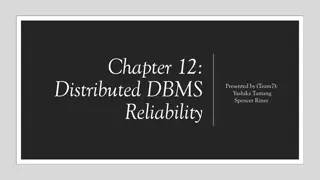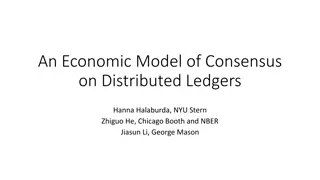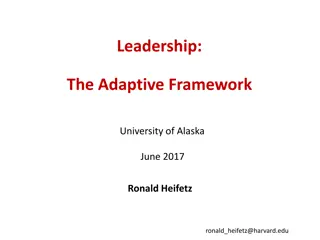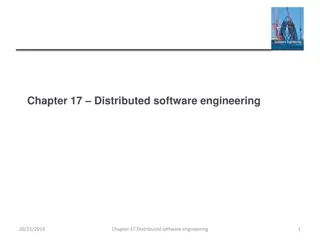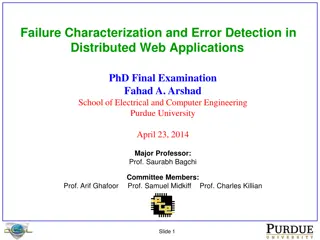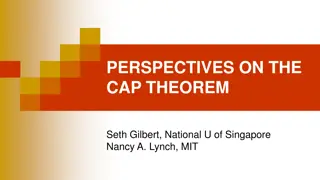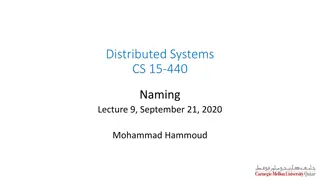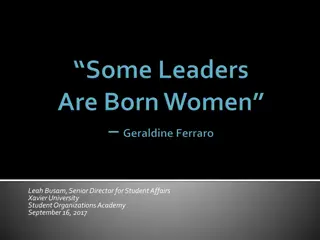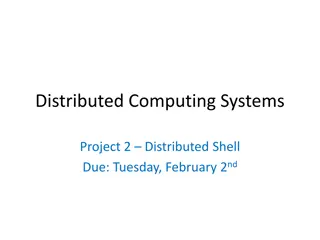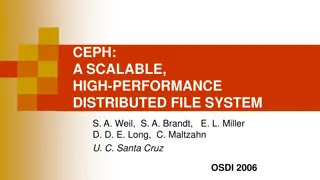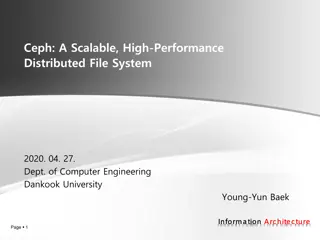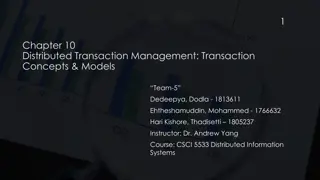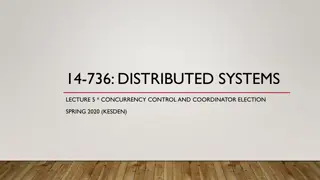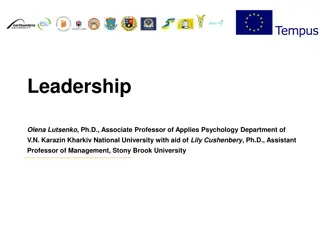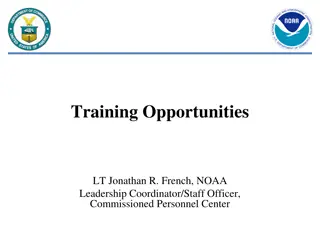Unveiling the Leadership Beatitudes: A Workshop on Servant Leadership
Delve into the essence of servant leadership through "The Joy of Leadership: Leadership in the League" workshop. Explore the Beatitudes of a Leader, reflect on the power of prayer in leadership, and learn to let your light shine in serving others. Discover how to embrace your unique gifts to fulfill
0 views • 34 slides
Enhancing Educational Leadership and Management in Schools
Educational leadership and management processes play a crucial role in ensuring high-quality teaching and learning experiences. This involves attention to instructional leadership, effective use of educators through distributed leadership, and adherence to professional teaching standards. Challenges
0 views • 9 slides
Overview of Distributed Systems: Characteristics, Classification, Computation, Communication, and Fault Models
Characterizing Distributed Systems: Multiple autonomous computers with CPUs, memory, storage, and I/O paths, interconnected geographically, shared state, global invariants. Classifying Distributed Systems: Based on synchrony, communication medium, fault models like crash and Byzantine failures. Comp
9 views • 126 slides
Middle Leadership Programme (MLP)
The Middle Leadership Programme (MLP) is an online self-directed program supported by blended learning approaches. It focuses on Leading the Function behaviors in the NFCC Leadership Framework and consists of four modules covering different areas. It complements existing development programs and ali
1 views • 18 slides
Overview of Distributed Operating Systems
Distributed Operating Systems (DOS) manage computer resources and provide users with convenient interfaces. Unlike centralized systems, DOS runs on multiple independent CPUs and prioritizes software over hardware. It ensures transparency and fault tolerance, with a focus on software error handling.
1 views • 36 slides
Understanding Leadership: A Comprehensive Overview
Explore the realm of leadership in organizational behavior through topics like recognizing good and poor leadership, the history of leadership theories, and the distinction between leadership and management. Dive into the evolution of leadership approaches, from early trait theories to behavioral an
2 views • 31 slides
Understanding CS 394B: Blockchain Systems and Distributed Consensus
This course, led by Assistant Professor Marco Canini, delves into the technical aspects of blockchain technologies, distributed consensus, and secure software engineering. Students will engage in flipped classroom-style classes and paper presentations, critiquing research papers, defending research
0 views • 65 slides
Exploring Leadership Theories: Traits and Behaviors
Leadership theories have evolved from trait theory focusing on personal qualities to behavioral theories emphasizing actions and interactions. While early research sought universal traits for leadership, it encountered challenges due to varied traits among leaders and non-leaders. Behavioral theorie
2 views • 29 slides
Understanding Parallel and Distributed Computing Systems
In parallel computing, processing elements collaborate to solve problems, while distributed systems appear as a single coherent system to users, made up of independent computers. Contemporary computing systems like mobile devices, IoT devices, and high-end gaming computers incorporate parallel and d
1 views • 11 slides
Understanding Remote Method Invocation (RMI) in Distributed Systems
A distributed system involves software components on different computers communicating through message passing to achieve common goals. Organized with middleware like RMI, it allows for interactions across heterogeneous networks. RMI facilitates building distributed Java systems by enabling method i
1 views • 47 slides
Distributed DBMS Reliability Concepts and Measures
Distributed DBMS reliability is crucial for ensuring continuous user request processing despite system failures. This chapter delves into fundamental definitions, fault classifications, and types of faults like hard and soft failures in distributed systems. Understanding reliability concepts helps i
0 views • 58 slides
Army Leadership Doctrine Update: ADP 6-22.1 Highlights
New Army Doctrine Publication (ADP) 6-22.1, "Army Leadership and the Profession," emphasizes the foundational principles of leadership with updated content and guidance. It covers essential leadership traits, values, competencies, and behaviors, providing insights into effective leadership practices
1 views • 6 slides
Dynamic Inspiration: Developing Leadership at 2015 National Order of the Arrow Conference
Welcome to the 2015 National Order of the Arrow Conference focusing on Dynamic Inspiration and Developing Leadership. Join us to explore the essence of leadership, from defining it in a word to ranking its attributes. Discover the significance of good and bad leadership, leading by example, and buil
0 views • 8 slides
Leadership Insights and Lessons for Ethical Leadership
Explore valuable insights on leadership, ethical values, and servant leadership principles shared by Dr. Castruita. The content covers topics such as developing a strong personal character, promoting a culture of responsibility, and serving others with humility and integrity. Gain knowledge on remov
0 views • 9 slides
GwE NPQH Development Programme - Aspiring Headteachers Leadership Pipeline
Focusing on fostering aptitude and aspiration in aspiring Headteachers, the GwE NPQH Development Programme aims to build a first-class leadership pipeline for outstanding school leadership. Through experiential learning, group interaction, and personal reflection, participants explore key themes in
0 views • 4 slides
Economic Models of Consensus on Distributed Ledgers in Blockchain Technology
This study delves into Byzantine Fault Tolerance (BFT) protocols in the realm of distributed ledgers, exploring the complexities of achieving consensus in trusted adversarial environments. The research examines the classic problem in computer science where distributed nodes communicate to reach agre
0 views • 34 slides
Distributed Algorithms for Leader Election in Anonymous Systems
Distributed algorithms play a crucial role in leader election within anonymous systems where nodes lack unique identifiers. The content discusses the challenges and impossibility results of deterministic leader election in such systems. It explains synchronous and asynchronous distributed algorithms
2 views • 11 slides
Overview of Distributed Systems, RAID, Lustre, MogileFS, and HDFS
Distributed systems encompass a range of technologies aimed at improving storage efficiency and reliability. This includes RAID (Redundant Array of Inexpensive Disks) strategies such as RAID levels, Lustre Linux Cluster for high-performance clusters, MogileFS for fast content delivery, and HDFS (Had
0 views • 23 slides
Understanding Leadership: Key Concepts and Differentiation
Leadership, as explained by Ronald Heifetz, goes beyond personal traits and authority. It involves problem-solving and capacity-building in a dynamic world. The distinction between leadership and authority is crucial, emphasizing leadership as a practice rather than a set of inherent characteristics
0 views • 83 slides
Exploring Distributed Leadership Perspectives Held by Secondary Head Teachers in South Wales
This research delves into the perspectives on distributed leadership (DL) held by secondary head teachers in South Wales. The study aims to understand how head teachers define and implement distributed leadership in their schools, exploring concepts such as trust, accountability, and the role of ext
0 views • 18 slides
Distributed Software Engineering Overview
Distributed software engineering plays a crucial role in modern enterprise computing systems where large computer-based systems are distributed over multiple computers for improved performance, fault tolerance, and scalability. This involves resource sharing, openness, concurrency, and fault toleran
0 views • 66 slides
Challenges in Detecting and Characterizing Failures in Distributed Web Applications
The final examination presented by Fahad A. Arshad at Purdue University in 2014 delves into the complexities of failure characterization and error detection in distributed web applications. The presentation highlights the reasons behind failures, such as limited testing and high developer turnover r
0 views • 53 slides
Google Spanner: A Distributed Multiversion Database Overview
Represented at OSDI 2012 by Wilson Hsieh, Google Spanner is a globally distributed database system that offers general-purpose transactions and SQL query support. It features lock-free distributed read transactions, ensuring external consistency of distributed transactions. Spanner enables property
0 views • 27 slides
Understanding the CAP Theorem in Distributed Systems
The CAP Theorem, as discussed by Seth Gilbert and Nancy A. Lynch, highlights the tradeoffs between Consistency, Availability, and Partition Tolerance in distributed systems. It explains how a distributed service cannot provide all three aspects simultaneously, leading to practical compromises and re
0 views • 28 slides
Understanding Distributed Hash Table (DHT) in Distributed Systems
In this lecture, Mohammad Hammoud discusses the concept of Distributed Hash Tables (DHT) in distributed systems, focusing on key aspects such as classes of naming, Chord DHT, node entities, key resolution algorithms, and the key resolution process in Chord. The session covers various components of D
0 views • 35 slides
Leadership and Management Insights: Skills, Traits, and Theories
Explore the key differences between leadership and management, uncover the essential skills and qualities of effective leaders versus managers, and delve into various leadership theories such as Trait Theory and Situational/Contingency Models. Discover the fundamental aspects and techniques of leade
0 views • 39 slides
Distributed Database Management and Transactions Overview
Explore the world of distributed database management and transactions with a focus on topics such as geo-distributed nature, replication, isolation among transactions, transaction recovery, and low-latency maintenance. Understand concepts like serializability, hops, and sequence number vectors in ma
0 views • 17 slides
Developing PE Subject Leadership Course Overview
This course aims to enhance subject leadership skills in Physical Education, focusing on leadership development, exploring the role of subject leaders, and improving outcomes for pupils. Participants will reflect on their leadership stage, revisit the core purpose of subject leadership, and develop
0 views • 49 slides
International Leadership Symposium Highlights and Insights
This overview captures the essence of the International Leadership Symposium featuring key figures like Brian Serafini and Joanne Robinson. The symposium addresses crucial topics such as leadership skills, questions for school leadership associations, and the importance of forming leadership network
0 views • 28 slides
Comprehensive Overview of Leadership Theories and Styles
Leadership encompasses the ability to influence a group towards achieving goals by knowing oneself, communicating vision, building trust, and taking effective action. Various leadership styles include Autocratic, Democratic, Free-Rein, and Paternalistic, each with distinct decision-making approaches
0 views • 19 slides
The Importance of Women Leadership in Higher Education
Leah Busam, a leader and professional, emphasizes the significance of women in leadership roles in universities. The content discusses the underrepresentation of women in key positions, highlighting the need for greater female participation in leadership. It showcases statistics on women's enrollmen
0 views • 22 slides
Distributed Computing Systems Project: Distributed Shell Implementation
Explore the concept of a Distributed Shell in the realm of distributed computing systems, where commands can be executed on remote machines with results returned to users. The project involves building a client-server setup for a Distributed Shell, incorporating functionalities like authentication,
0 views • 14 slides
Exploring Effective and Ineffective Leadership Qualities in One Health Leadership
In the world of One Health leadership, the focus is on graduating multidisciplinary teams that can initiate shared visions and inspire across sectors. This involves fostering teamwork, professionalism, and emotional intelligence. Activities include identifying admirable and ineffective leaders, disc
0 views • 46 slides
Overview of Ceph Distributed File System
Ceph is a scalable, high-performance distributed file system designed for excellent performance, reliability, and scalability in very large systems. It employs innovative strategies like distributed dynamic metadata management, pseudo-random data distribution, and decoupling data and metadata tasks
0 views • 42 slides
Overview of Ceph: A Scalable Distributed File System
Ceph is a high-performance distributed file system known for its excellent performance, reliability, and scalability. It decouples metadata and data operations, leverages OSD intelligence for complexity distribution, and utilizes adaptive metadata cluster architecture. Ceph ensures the separation of
0 views • 23 slides
Distributed Transaction Management in CSCI 5533 Course
Exploring transaction concepts and models in distributed systems, Team 5 comprising Dedeepya, Dodla, Ehtheshamuddin, and Hari Kishore under the guidance of Dr. Andrew Yang delve into the intricacies of distributed transaction management in CSCI 5533 Distributed Information Systems.
0 views • 56 slides
Concurrency Control and Coordinator Election in Distributed Systems
This content delves into the key concepts of concurrency control and coordinator election in distributed systems. It covers classical concurrency control mechanisms like Semaphores, Mutexes, and Monitors, and explores the challenges and goals of distributed mutual exclusion. Various approaches such
0 views • 48 slides
Quantum Distributed Proofs for Replicated Data
This research explores Quantum Distributed Computing protocols for tasks like leader election, Byzantine agreement, and more. It introduces Quantum dMA protocols for verifying equality of replicated data on a network without shared randomness. The study discusses the need for efficient protocols wit
0 views • 28 slides
Understanding Leadership Theories and Styles
Leadership involves influencing a group towards a common goal. Traits, interaction styles, and group dynamics play vital roles in effective leadership. Various theories, such as Trait Theories and Synthetic Leadership Theories, provide insights into different aspects of leadership. Understanding lea
0 views • 41 slides
Leadership Training Opportunities for NOAA Personnel
Explore various training programs available for NOAA personnel, including Basic Officer Training Course (BOTC), Leadership Development, and Operational Leadership Training. Discover the importance of leadership skills, military protocol, and NOAA Corps heritage in equipping officers for their roles.
0 views • 16 slides

